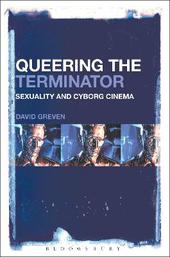
|
Queering The Terminator: Sexuality and Cyborg Cinema
Paperback / softback
Main Details
| Title |
Queering The Terminator: Sexuality and Cyborg Cinema
|
| Authors and Contributors |
By (author) David Greven
|
| Physical Properties |
| Format:Paperback / softback | | Pages:216 | | Dimensions(mm): Height 229,Width 152 |
|
| Category/Genre | Film theory and criticism |
|---|
| ISBN/Barcode |
9781501348075
|
| Classifications | Dewey:791.4375 |
|---|
| Audience | | Tertiary Education (US: College) | |
|---|
| Illustrations |
19 bw illus
|
|
Publishing Details |
| Publisher |
Bloomsbury Publishing Plc
|
| Imprint |
Bloomsbury Academic USA
|
| Publication Date |
27 December 2018 |
| Publication Country |
United States
|
Description
The Terminator film series is an unlikely site of queer affiliation. The entire premise revolves around both heterosexual intercourse and the woman's pregnancy and giving birth. It is precisely the Terminator's indifference to both that signifies it as an unimaginably inhuman monstrosity. Indeed, the films' overarching contention that humanity must be saved, rooted as it is in a particular story about pregnancy and birth that exclusively focuses on the heterosexual couple and the family, would appear to put it at odds with the political stances of contemporary queer theory. Yet, as this book argues, there is considerable queer interest in the Terminator mythos. The films provide a framework for interpreting shifting gender codes and the emergence of queer sexuality over the period of three decades. Significantly, the series emerges in the Reagan 80s, which marked a decisive break with the sexual fluidity of the 70s. As a franchise and on the individual basis of each film, The Terminator series combines both radical and reactionary elements. Each film reflects the struggles over gender and sexuality specific to its release. At the same time, the series foregrounds the intersection of technology and gender that has become a definitive aspect of contemporary experience. A narrative organized around a conservative view of female sexuality and the family, the Terminator myth is nevertheless a richly suggestive narrative for queer theory and gender studies.
Author Biography
David Greven is Professor of English at the University of South Carolina, USA, and the author of many books, including Psycho-Sexual: Male Desire in Hitchcock, De Palma, Scorsese, and Friedkin and Manhood in Hollywood from Bush to Bush.
ReviewsA fascinating and illuminating analysis of The Terminator films, examining and revealing both the gender politics and shifts in sexuality contemporary with the series production. Greven also demonstrates how these changes shape the subliminal and metaphorical undertones of the films and their plots. * Journal of Gender Studies * Queering the Terminator provides a lively, compelling exploration of the "un-likeliness of desire," showing that mainstream texts do speak to queers even when apparently not doing so. Rereading the Terminator films and television series for their fetishistic emphases and in light of their cultural and historical contexts, David Greven finds male vulnerability, feminist strength, fascist masculinity, pedophilic attraction, and gender-fluid sexuality all on display, alongside the series' more obvious preoccupations with time travel, trauma, the heterosexual couple, and the child. An innovative and welcome addition to the already considerable scholarship about this globally influential media franchise. * Chris Holmlund, author of Impossible Bodies and Female Trouble, and the editor or co-editor of Between the Sheets, In the Streets: Queer, Lesbian, Gay Documentary, Contemporary American Independent Film, American Film of the 1990s, and The Ultimate Stallone Reader * This knowledgeable and engaging look at the Terminator saga offers new, sometimes surprising, perspectives. Examining the entire film canon to date and including the TV series, Greven works outward from his own viewing experience, providing a skilful unpicking of the contexts and contradictions of the iconic science fiction series. * Lorna Jowett, Reader in Television Studies, the University of Northampton, UK *
|